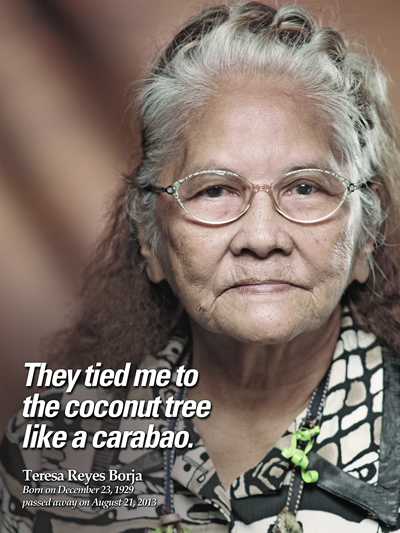 Excuse me. I think I'm kind of nervous because I'm 74 years old today, and in the Japanese time I'm only 12 years old. So the first time in my life I come up here to testify. So I'm sorry. I am kind of nervous. I think I'm going to speak English so I can speak short.
Excuse me. I think I'm kind of nervous because I'm 74 years old today, and in the Japanese time I'm only 12 years old. So the first time in my life I come up here to testify. So I'm sorry. I am kind of nervous. I think I'm going to speak English so I can speak short.
During the Japanese time, I'm 12 years old, and all I know, all I remember, is we hide in the jungle and then, after that, when everything is settled, they send us -- my mother is very crippled, and that's why I'm too painful right now because I'm the only survivor. My six brothers, my two sisters, my mother are all passed away, so I'm very sad and painful right now. That's why -- and I'm nervous right now.
So all I remember is when they start making us go out to work, we beg the Japanese for my mother not to make her go out to work because she's crippled. But still, they want her to go out and work. That's a very sad and painful for me right now. So they force us to march. They force us labor and everything. And one of my brother was beaten up and, after that, they take him and then they kill him.
That's very painful for me right now. Sometimes I don't remember what I'm going to say, but right now I'm going to say it again. They tied me to the coconut tree like a carabao or a cow. That's a very sad. And right now, like only a couple of months back when they tie me there for almost one day, they tie me to the coconut tree and they almost killed us. I hope to God people from Merizo so they can know what I'm saying and it's true. And it's very painful for me when I think about that.
Only I know that the carabao and the cow are tied not the human being, but that time I was tied up for almost one day when I'm 12 years old. It's so sad. And then, my mother telling us to tell the Japanese if they can make her stay home. Instead, not home because home is house, but the ranch -- if they can make her stay in the ranch, but they cannot. They force my mother to go out and work, and she's crippled. That's why it's very painful. Right now, I'm the only survivor.
That's why it's very hard for me. I don't want to testify, but I force myself to testify right now. I got only my children, my grandchildren, and my great-grandchildren right now. Nine of us in the family, and only me. I'm the only survivor right now. I know what's going to happen, when I come up here I'm going to be nervous, but I forced myself to come up here to testify. This is very hard. They make us march for I don't know how many miles in the jungle, jungle by jungle.
And the Japanese almost catch us because my mother cannot walk fast. My brothers, they taking turns to carry her in the jungle. So we keep on walking I don't know how many miles to hide in the deep jungle. That's very painful for me. So when my brother -- I said already about one of my brothers. They beat him up, and then, after that, they take him and they kill him. So sometimes I don't even know what to say.
It's a long story, and I think the people that came here today, what they say, it's true. And I don't want to say. It's a long story to say everything what the Japanese did to us, to me and all my family. So I'm glad I'm still living right now, and I'm the only survivor. I hope one of my brothers and my sisters is going to be here and to help me what I'm going to say, but I'm the only survivor right now.
I have to do it myself. My name is Teresa Borja. I didn't even say in the beginning my name, but my name is Teresa Borja. I'm sorry I'm nervous right now.
Real People. Real Stories. A weekly testimonial series provided by the Office of Senator Frank F. Blas, Jr. The testimony of Teresa Reyes Borja, is recorded in the Guam War Claims Review Commission public hearing held in Hagåtña, Guam on December 9, 2003. This story sponsored by the community involvement of Jones & Guerrero Co., Inc. Photo courtesy of Expressions Studio.
 |

